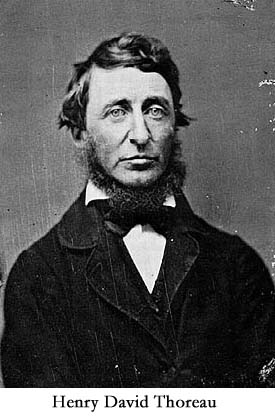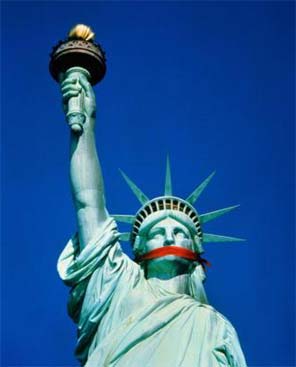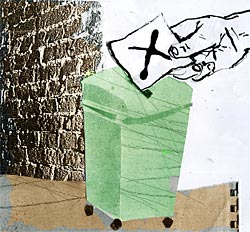If I had as many lives as I have hairs on my head
or drops of blood in my veins,
I would give them all up for this cause,for the Liberties of England!
John Bastwick (as quoted on Rev Hammer's 'Freeborn John' album)
These are troubled times both for Liberty and for Democracy; each of these concepts is, of course, meaningless without the other. Liberties that took 500 years and countless lives to secure are being rolled back in the name of ‘security’ by a self-serving political elite who treat the democratic process and the electorate with undisguised contempt. To cite security as a reason to deny liberty shows that the politicians – on both sides of the Atlantic – have learnt nothing in the 250 years since Benjamin Franklin famously wrote…
“They who would give up essential liberty to purchase a little temporary safety, deserve neither liberty nor safety.”
from the title page of An Historical Review of the Constitution and Government of Pennsylvania. 1759
In truth it is not just the years that divide today’s politicians from their enlightenment forebears. There was once a commitment – in philosophy at least, if not in practice – to the belief that government should be no more than a tool that exists to guarantee and protect the basic freedoms and liberties of it’s people so that each person might live as full a life as possible. This sentiment was best summed up in the motto “That government is best which governs least” (often attributed to Thomas Jefferson or Thomas Paine, but actually made famous by Henry David Thoreau’s 1849 essay, ‘Civil Disobedience‘ wher he paraphrases the motto of The United States Magazine and Democratic Review: “The best government is that which governs least.”).

But modern governments are all too willing to try and control every aspect of human life and few of us today feel that government and politicians are acting in the interests of the people.

The Liberties of England should be our proudest achievement; the social, economic and legal rights enshrined by Magna Carta (both the Great Charter and The Charter of the Forest – see Peter Linebaugh’s ‘The Magna Carta Manifeston: Liberties and Commons for all.‘) have had a global influence beyond the imagination of the Barons who drafted them – and I believe that they will continue to be of immense symbolic importance as we enter the third millennium. These documents were cited during the English, French and American revolutions and were even mentioned during the 1994 Zapatista uprising, but in today’s Britain the basic liberties of habeas corpus, trial by jury, the right to silence, due process and the right to free speech are all being threatened by the government’s supposed attempts at fighting ‘terrorism’ and ‘organised crime’.

The legal system of England and Wales has never been perfect and is far from impartial, but rather than attempt to democratise the judiciary the Labour government has chosen to bypass it altogether. A fundamental principle of justice is that the same person or authority that brings a criminal allegation against an individual should not then decide whether that person is guilty – i.e. the police make an arrest and then the courts decide upon guilt. This is essential if we believe that a person is innocent before being proved guilty. But the government’s Anti-Social Behaviour Order (ASBO) and subsequent related laws have effectively made the police- and, worse still, local authorities – judge, jury and executioner regarding a large number of offences. And despite the Labour government creating over 3000 new criminal offences since 1997 violent crime (all crimes against the person have to be considered the worst possible crimes in a humane society) has risen by nearly 80%.
![Knife Crime[6] Knife Crime[6]](https://wynfrith.files.wordpress.com/2009/08/knife-crime6.jpg?w=490)

Lady Justice - now dumb as well as blind!
In relation to ‘crime’ and the ‘terrorist threat’ we are also witnessing a widespread and ongoing abuse of the basic right to privacy. The famous 16th Century barrister, Sir Edward Coke helped to revive a general interest in Magna Carta and his work would heavily influence both English and American revolutionaries. Coke’s best known statement is arguably…
“For a man’s house is his castle, et domus sua cuique est tutissimum refugium [and each man’s home is his safest refuge].”
…from whence we get the quote “An Englishman’s home is his castle”. But today our ‘castles’ are being stormed (or at least placed under seige…) ‘for our own protection’ and privacy has become yet another victim of security.

The sad truth, of course, is that the more we are denied our hard-fought liberties the weaker our democracy becomes; which, in turn, undermines the government’s claims that the ‘war on terrorism’ is a battle for democracy and freedom. Marcus Aurelius said “The best revenge is to be unlike him who performed the injury.“; if we give up an ounce of liberty then we ourselves become an enemy of democracy. Not that we English have much democracy left to lose…
In Britain government (both national and European) is becoming ever more invasive and is slowly creeping into every corner of our lives whilst giving us fewer and fewer opportunities to influence, oppose or even debate important political decisions. In England the situation is even more bleak; since devolution we are the only county in the EU which does not have it’s own parliament or national assembly. For better or worse decisions that directly effect the citizens of England are not solely in the hands of English citizens. The following quote cited by The Witanagemot Club shows the worrying extent of this problem…
Encyclopedia Britannica : England
Outside the British Isles, England is often erroneously considered synonymous with the island of Great Britain ( England , Scotland , and Wales ) and even with the entire United Kingdom . Despite the political, economic, and cultural legacy that has secured the perpetuation of its name, England no longer officially exists as a governmental or political unit—unlike Scotland, Wales, and Northern Ireland, which all have varying degrees of self-government in domestic affairs. It is rare for institutions to operate for England alone. Notable exceptions are the Church of England ( Wales , Scotland , and Ireland , including Northern Ireland , have separate branches of the Anglican Communion) and sports associations for cricket, rugby, and football (soccer). In many ways England has seemingly been absorbed within the larger mass of Great Britain since the Act of Union of 1707.’ — Encyclopedia Britannica, 2004.
This is known as “the West Lothian Question” after a 1977 speech by Tam Dalyell, the then Scottish Labour MP for West Lothian, in which he stated…
For how long will English constituencies and English Honourable members tolerate… Honourable Members from Scotland, Wales and Northern Ireland exercising an important, and probably often decisive, effect on English politics while they themselves have no say in the same matters in Scotland, Wales and Northern Ireland?
This situation is further exacerbated by the fact that local governments – which should be on the front line of democracy – have been robbed of any real power. In all but the smallest councils the committee system – which helped local residents have at least some say in local government – has been replaced by dictates from central government, ‘elected mayors’ (or ‘strong leaders’), quangos and/or almos – all with the minimum of accountability. In 2006 a report by the Joseph Rowntree Foundation’s POWER Inquiry concluded that the deep rooted problems with British democracy are “systemic not personal”; in general neither the public nor the politicians are guilty of apathy(though it is the politicians who have the most to gain from the current state of affairs), but the present system creates a high level of political alienation combined with extremely low levels of confidence which, in turn, leaves both the public and the politicians feeling powerless. English Democracy – which has existed on and off in one form or another since the 7th Century – may not be dead, but it’s in a critical condition.

Unfortunately no single political party or independent politician is in a position to single-handedly change this worrying state of affairs even if they wanted to. What’s needed is the most far reaching constitutional change to be seen in England since the Civil Wars or the Act of Union! (I am stressing the English problem as the population of England are in a rather unique political situation; citizens of Wales and Northern Ireland are only marginally better off – remember we’re talking solely about democratic rights here – and the citizens of Scotland are in the best position, relatively speaking. But Britain as a whole remains in crisis with regard to liberty and democracy – so Britain as a whole must work towards a solution).
Luckily we are beginning to see the first signs of a much needed people’s movement for change. The aforementioned Joseph Rowntree Trust have just taken over the Real Change campaign which was launched (originally as ‘Magna Carta 2.0’, which I personally thought was a better title) by members of openDemocracy to try and encourage…
- An intelligent self-governing citizens’ movement for much better democracy and liberty in Britain
- A serious debate about the future of modern democracy, liberty and human rights, drawing on the best of international ideas.
The Real Change site says…
We aim to bring this movement into being through a new group: Real Change: the open politics network. The parties and politicians cannot be relied upon to deliver real change for us [sic]. Citizens have to be in the driving seat. Recent pronouncements by the Prime Minister and the leader of the opposition offer little more than vague and cosmetic changes. “Reform so as to preserve” is still the mantra of the political elite, who hope the wave of popular outrage will once again crash and dissipate into passive acquiescence.
Blogland is awash with people of all political persuasions drawing much the same conclusions. Old differences are being set aside as people realise that ideology will count for nothing if we do not address the current crisis of democracy, liberty and human rights. But this fight will not be won in cyberspace; if we are to protect the Liberties of England we must endeavour to bring the campaign to the people.
What I am about to suggest is not a campaign in it’s own right, it is simply a strategy to get people talking. We need a highly visible, non-partisan, popular symbol to signify a heartfelt commitment to regain, preserve and expand our aforementioned democracy, liberty and human rights. (We also need non-partisan democracy, but that’s another story – or rather another blog post.)
I want to re-introduce the sea-green ribbon as a symbol of liberty and democracy.

Sea-green ribbons were worn by members and supporters of the Levellers during the English Revolution. The movement began in July 1646 when people came together to petition parliament in an attempt to free John Lilburne, England’s greatest unsung hero, from the Tower of London where he faced the death penalty on grounds of ‘treason’ (Lilburne remains the only man to be tried for treason by both the crown and by parliament). Known as ‘Freeborn John’, Lilburne is admired across the political spectrum because his life physically embodied a sense of freedom that remains an inspiration for us all.

The Levellers were a short lived movement (thanks mainly to the duplicity and cruelty of Cromwell), but their legacy remains relevant even today. As we can see from their main documents (see Richard Overton’s ‘An Arrow Against All Tyrants‘, ‘The Agreement of the People‘ and ‘An Agreement of the Free People‘) and transcripts of The Putney Debates the Levellers believed in the Liberties of England, equality and social justice. Among other things, Tony Benn (speaking at the annual Levellers Day event in Burford, Oxfordshire) has cited a few central beliefs that he believes would be of significance today (please do not take this as a nod to ‘the left’, I have already stated that the crisis of liberty is such that it is more important than political allegiance – to which I am ‘left-libertarian’)…
The Levellers would uphold the rights of the people to recall and replace their parliamentary candidates because of the inalienable sovereignty of the people which no Parliament has any right to usurp.
The Levellers would demand a far greater public accountability by all those who exercise centralised civil, political, scientific, technical, educational and mass media power through the great bureaucracies of the world, and would call for the democratic control of it all.
The Levellers would warn against looking for deliverance to any elite group, whatever its origins, even if it came from the Labour movement, who might claim some special ability to carry through reforms by proxy, free from the discipline of recall or re-election.
The Levellers would argue passionately for free speech and make common cause, worldwide, with those who fight for human rights against tyrants and dictators of all political colours
Also the Levellers called for an elected judiciary and an end to both elitism and elitist terminology with regard to the law. So I do not believe they would have been wholly satisfied with our current legal system and they certainly would have been horrified by the law-making powers of our unelected and unaccountable Brussels commissioners.
With this in mind I feel that the use of the colour Sea-Green as a political/philosophical statement would give provide us with a highly visible and unified identity. Sea-green could easily be adopted by any individual or group who is committed to fighting for the protection and expansion of liberty, democracy and human rights. Now, has anyone got any sea-green cloth?

Further reading
A. C. Grayling ‘Towards the Light: The Story of the Struggles for Liberty and Rights That Made the Modern West‘
A concise history of how people fought and died to secure our liberties.
Dominic Raab ‘The Assault on Liberty: What Went Wrong With Rights‘
How we have lost basic liberties and rights in recent years.



1 comment
Comments feed for this article
August 18, 2009 at 4:43 pm
We’ll Keep the Sea-Green Flag Flying Here! « My Arse
[…] can read Wynnie’s entire blog post here. Possibly related posts: (automatically generated)Beyond Mom: Love LetterParsing ObamaWhy Voters […]